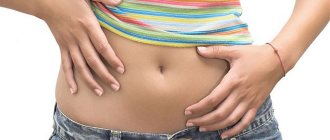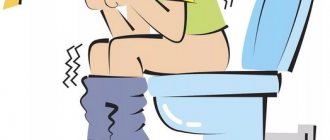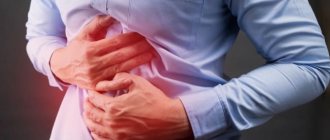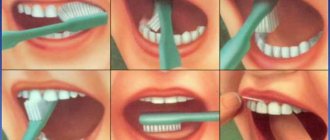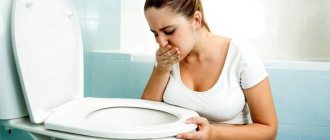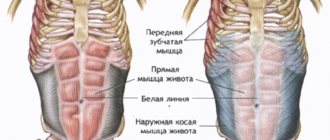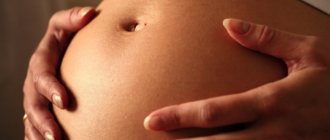Causes of bowel movement disorders
Eating irregularities can cause constipation.
For some, difficulties with excreting feces appear occasionally, while for others, an overcrowded intestine occurs constantly. Why is this happening? Most often, the feeling of incomplete bowel movement occurs in people prone to constipation or with functional bowel disease. The causes of the disorder are different, even psychological, but the most common among them are the following:
- poor diet (processed foods and not eating enough fiber);
- lack of physical activity leads to stagnation in the pelvic organs;
- stressful situations and nervous shocks;
- use of large quantities of medications, including laxatives (tablets, suppositories, syrups);
- injuries and general diseases of internal organs.
Doctors identify a tendency to constipation as a separate cause that causes a feeling of fullness in the intestines. Insufficient bowel movements are not an independent disease, but a symptom of it. The most common causes of constipation are:
- congenital or acquired abnormalities of the intestinal structure;
- the presence of neoplasms in the organ: benign or malignant;
- disorder of intestinal motor-evacuation function.
Individual determination of the cause of incomplete emptying syndrome includes all disturbing signs and a mandatory examination.
Etiology
Incomplete emptying of the rectum can be a consequence of certain pathological processes, as well as external factors.
Pathological causes of incomplete bowel movement may be the following:
- irritable bowel syndrome;
- formation of fecal stones;
- formation of polyps in the colon;
- benign or malignant formations in the rectum;
- hemorrhoids and other proctological diseases;
- hormonal imbalance;
- dysbacteriosis;
- chronic gastroenterological diseases that lead to constipation.
In addition, incomplete bowel movement syndrome can be caused by external etiological factors such as:
- sedentary lifestyle;
- obesity;
- unhealthy diet – there is no liquid food in the diet, a person abuses fast food and flour products;
- stress, constant nervous tension.
Also, in this case, one should not exclude a genetic predisposition to such pathological processes and a psychosomatic factor.
It is important to understand that if such a syndrome occurs frequently, then you should definitely consult a doctor, since in most cases it is a sign of the development of a pathological process in the gastrointestinal tract.
Symptoms
Constipation is the body's signal about a problem with the gastrointestinal tract.
Regular bowel movements are a necessary condition for the normal functioning of the body. Failure to comply with this condition puts not only the organs of the digestive system at risk. The body immediately warns of a complication that has arisen, and the feeling of a full intestine is not the only symptom. There are signs not related to the digestive organ.
Bowel symptoms
- Violation of the process of defecation. One has constipation, in which bowel movements are delayed, while the other has diarrhea and rapid removal of contents. There is no urge to defecate, or the urge is false.
- Pain is a mandatory symptom caused by stimulation of nerve processes and dilation of the intestine. It can be different: dull, raw, cramping, sharp. Pain in the lower abdomen, on the left side, is a characteristic feature of constipation. When upset, it spreads throughout the abdomen.
- Painful swelling.
- Heaviness in the stomach. The process of emptying is carried out with tension and is painful. There remains a feeling of incomplete bowel movement after defecation.
Other symptoms
It happens that in addition to the above-described signs:
- headache;
- insomnia;
- pain in the lumbar region;
- general weakness.
Physiological reasons and signs of frequent visits to the toilet by and large
Repeated bowel movements are not always a manifestation of the disease. In some cases, frequent visits to the toilet are largely related to diet. The predominance of raw vegetables and fruits, bran and wholemeal bread, oatmeal and wheat porridge, greens, and berries in the diet can lead to cleansing of the body up to 3-4 times a day. Such foods are rich in fiber, which stimulates intestinal motility. At the same time, stool rarely changes its consistency, often sausage-shaped, sometimes more liquid. But there is an important sign - the absence of mucus, blood and undigested food.
Dairy products have a laxative effect: fresh kefir, milk, whey, yogurt. Among dried fruits, prunes improve intestinal cleansing. A diet rich in fiber and milk sugar normally does not cause flatulence (increased gas production), abdominal pain and discomfort during bowel movements. This is the second important sign of a physiological increase in stool frequency.
Vegetarians and raw foodists visit the toilet more often, largely due to their dietary habits. Therefore, plant-based dieters should not worry about frequent bowel movements, provided that the stool is normal in appearance and the colon cleansing process is painless.
Pregnancy
During gestation, hormonal changes occur in a woman’s body, which also affects the digestive tract. At the beginning of pregnancy, a large amount of progesterone is released into the blood, a hormone designed to reduce the tone of the uterus and preserve the fetus. Under the influence of progesterone, the intestinal muscles also relax, which leads to a frequent urge to defecate.
As the fetus grows, the uterus puts pressure on the bladder and large intestine. At later stages of pregnancy, a pregnant woman often goes to the toilet, largely due to mechanical irritation of the pelvic organs. The feces have normal consistency, color and composition. Bladder irritation is caused by frequent urination.
Diagnostics
A general blood and urine test will show whether there is an infection in the body.
The main task of specialists is to differentiate the problem of bowel movement from other diseases with similar symptoms. Diagnostics are carried out using specialized testing and a set of laboratory techniques. The list of methods is as follows:
- General analysis of urine and blood. Allows you to determine the condition of the body, eliminate inflammation and infection.
- Study of the chemical and physical characteristics of feces.
- If there is a suspicion that there is an infection in the intestine, bacteriological culture is performed.
- A biochemical blood test to evaluate the functioning of the pancreas and liver, which are directly involved in digestion.
- Examination of stool for the composition of microorganisms.
Instrumental diagnostic methods will help confirm the results obtained and make an accurate diagnosis:
- An endoscopic method that allows you to check the intestinal mucosa and determine the presence of damage and neoplasms. The duration of the procedure is about 10-15 minutes. The study is carried out using special equipment called an endoscope.
- Examination of the colon using X-rays using contrast. You can examine the structure and pathological abnormalities (irrigoscopy).
- Study of anorectal muscle tone and contraction of the small intestine.
Performing instrumental diagnostics will require special preparation of the patient.
Why is a private chair dangerous?
With increased bowel movements, the following consequences are possible:
- The development of vitamin deficiency and anemia, in which enzyme production deteriorates, and food entering the intestines remains unprocessed;
- If this pathology is not treated, significant weakening of vision, bleeding of the anal canal and bone fragility are possible;
- Vitamins and microelements required for the normal functioning of the body are released with feces;
- When the body produces insufficient bile acid, the number of trips to the toilet increases significantly during the day. The feces become oily and pale in color.
If you have frequent bowel movements with liquid diarrhea, we recommend that you read our other article: Causes and treatment of severe watery diarrhea in adults
How to treat the syndrome?
It is possible to achieve complete recovery by adhering to a comprehensive treatment method.
It is necessary to treat the syndrome not only with suppositories and tablets; great importance is given to the psychological and emotional state of the patient. Serious psychological problems require the intervention of a specialist who conducts psychotherapy sessions. In parallel with the settlement of the psycho-emotional state, treatment is carried out. There are several methods of therapy: traditional (medicinal) and folk.
Drug therapy
Treatment with medications is aimed at alleviating the condition and relieving bothersome symptoms. The doctor prescribes:
- probiotics that enrich the body with necessary enzymes and support the intestinal microflora, for example, Espumisan, Hilak Forte;
- strengthening drugs for diarrhea - “Loperamide”;
- prokinetics for constipation - Duphalac, Motilium, Bisacodyl, suppositories with glycerin, gas-forming suppositories;
- painkillers - No-Shpa, Papaverine, in Spazmomen suppositories.
Folk remedies
To enhance the effect, use the following traditional medicine recipes:
- Millet (porridge) or a mixture of blueberry leaves, bird cherry fruits, and burnet root help well against diarrhea. Mix the components in equal proportions and pour in 500 ml of boiling water. Let it sit for about 5-6 hours in a thermos to keep the water warm. Strain the resulting product and take 3 times a day.
- Blueberries, onion juice and aloe are great against constipation.
- Mint infusion and chamomile will help relieve unpleasant pain. For hemorrhoidal cones, the pain is relieved with ice suppositories.
Diet food
Diet is an integral part of treating the disease.
The right approach to nutrition is important in the treatment of the syndrome and as a prevention. A healthy, fractional diet is recommended for the patient; meals should be divided into 5-6 times and eaten in small portions. Products that increase flatulence (cabbage), alcohol, salty and smoked foods are completely excluded from the diet. The main part of the meal should be vegetables, fruits, dairy products, steamed meat and fish. It is imperative to monitor the amount of liquid you drink. In one day, a person should drink at least 2 liters and be sure to drink a glass of clean water in the morning, before meals.
Treatment
In case of a psychosomatic etiological factor in the development of such a disorder, specific treatment is not required: it is enough to normalize your lifestyle and eliminate those factors that lead to such a condition.
In general, treatment tactics will be aimed at eliminating the root cause.
The overall picture of therapeutic interventions can be based on the following:
- normalization of nutrition and diet;
- taking medications;
- Exercise therapy.
The pharmacological part of the treatment is based on the following drugs:
- gentle laxatives;
- antispasmodics;
- improving gastric motility;
- sedatives;
- sorbents.
Any drug should be taken only on the recommendation of a doctor and according to the regimen prescribed by him. Otherwise, serious complications may develop.
Possible consequences
Irregular emptying and the use of suppositories and syrups to improve the situation leads to addiction and general malaise and to more serious complications. If defecation does not occur completely or is delayed, the stool becomes dense and, passing through the intestines, leaves cracks and ulcers, resulting in an inflammatory process. Long-term disruption leads to the development of hemorrhoids, partial or complete obstruction.
Incomplete emptying syndrome is dangerous for people with heart failure, since straining during bowel movements can cause increased pressure.
Possible complications and prevention
A chronic pathological process leads to organic changes in the walls of the rectum. Lack of stool and congestion cause poisoning of the entire body. Its striking symptoms arise: frequent headaches, sleep disturbances, irritability, loss of appetite.
Compacted feces injure the anal sphincter during emptying, streaks of blood appear in the feces, and cracks form in the mucous membrane. The associated infection leads to purulent inflammation and ulcers.
The chronic process provokes the growth of fecal stones, which is dangerous due to partial or complete obstruction.
The appearance of blood in the stool indicates bleeding or perforation of the intestine, which requires immediate surgical attention. Problems with bowel movements are the cause of constant pushing. During this period, breathing is held, dizziness occurs, and blood pressure rises. This is dangerous for people with heart and vascular diseases.
Frequent use of suppositories and other medications is addictive. In addition, the drugs have contraindications for use.
The main component of preventing intestinal problems is a healthy lifestyle. This concept implies physical activity and giving up bad habits. It is necessary to include a sufficient amount of water and fiber in the diet. To strengthen the nervous system, prevent stressful situations and psychological disorders, it is useful to take B vitamins in combination.
Many natural processes take place in the human body, including defecation. Its frequency, duration and other characteristics allow doctors to assess the patient's health status.
For various reasons, malfunctions in the digestive system occur. A person does not eat properly, suppresses the urge to have a bowel movement, and drinks little water. A doctor will help you establish an accurate diagnosis and causes of disorders.
What to do?
The main goal of treatment is to improve the patient’s quality of life and normalize his emotional and psychological state. To treat the disease, diagnostic, traditional and folk methods are prescribed.
Incomplete bowel emptying is diagnosed using special tests, excluding all diseases with similar manifestations.
So, the specialist prescribes the following studies:
- stool analysis;
- blood biochemistry;
- irrigoscopy (x-ray of the intestines with filling with a contrast agent);
- colonoscopy (examination of the intestine at a distance of up to 1 m);
- sigmoidoscopy (examination with an endoscope).
Before diagnosis, the patient must undergo special training.
First you need to exclude the most well-known and simple causes of digestive dysfunction. The patient is prescribed a strict diet, medications, and food irritants (alcohol, coffee, fatty and spicy foods) are limited.
The following substances and products are excluded:
- antibiotics;
- laxatives;
- medicines with potassium and iron;
- products that form gases (flour products, cabbage).
Steamed fish and meat dishes are added to the diet; fruits vegetables; wheat bran, wholemeal bread. High fiber foods are added. Fractional meals are prescribed in small portions. It is advisable to drink mineral waters without gases.
The specialist also prescribes the following medications:
- To improve digestive functions and reduce gas formation. You can improve the digestive functions of the intestines with the help of enzymatic agents and pribiotics. It is important to maintain microflora with Hilak Forte and Espumisan.
- Consolidating agents for diarrhea (Loperamide, Smecta) or relaxing agents for constipation (prokinetic agents Motilium, Coordinax, Duphalac, Mucofalk, Sennade, Bisacodyl).
- Antispasmodics to eliminate spasms in the intestines (Dicetel, Duspatalin, Papaverine, No-shpa, Buscopan).
- For flatulence, Simecticon and Dimecticon are prescribed.
If dysbiosis is present, treatment is aimed at eliminating it.
Diarrhea can be cured using traditional methods using elderberry, burnet and millet porridge. Constipation can be relieved by using aloe juice, blueberry juice or onion juice.
You can relieve stomach pain with a decoction of chamomile and mint. Recommended are crackers, strong tea, blueberry broth, and jelly. For bloating, fermented milk products with prebiotics (yogurt, kefir) are prescribed.
For neuropathic pain, the doctor prescribes antidepressants. In addition to probiotics, herbal medicine and enzymes, acupuncture can be used in treatment. Peppermint oil helps relieve gases and relieve spasms of smooth muscles.
Preventive actions
If incomplete bowel movement regularly occurs, the patient must change his lifestyle, increase physical activity, choose the optimal diet with meals 4-5 times, adjust the daily routine, reduce the amount of worries and stress.
To reduce susceptibility to stress, psychological training is prescribed. You should stop consuming drugs for the treatment of intestinal diseases.
Treatment can be considered effective if the main symptoms are not identified in the future, pain is eliminated, stool is normalized, and the patient’s well-being improves.
The main role in the treatment of incomplete bowel movement is to improve the quality of life and psycho-emotional state of a person.
Every person, at least once in his life, experiences indigestion. Impaired bowel movement is the most common disorder. It immediately affects your well-being and disrupts your usual way of life. If such a problem causes discomfort for a long period, you need to contact a specialist and correct the situation.
IT IS IMPORTANT TO KNOW! Even a “neglected” gastrointestinal tract can be cured at home, without surgery or hospitals. Just read what Galina Savina says and read the recommendation.
